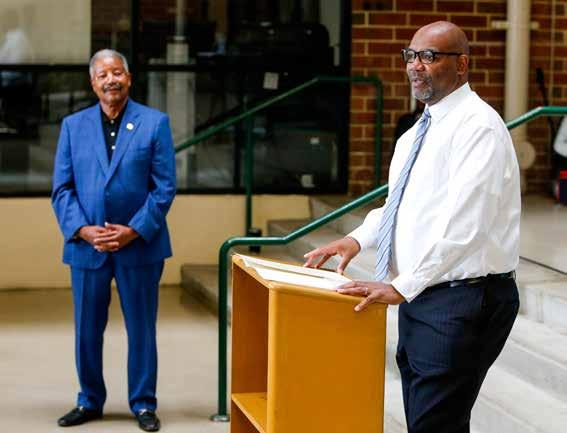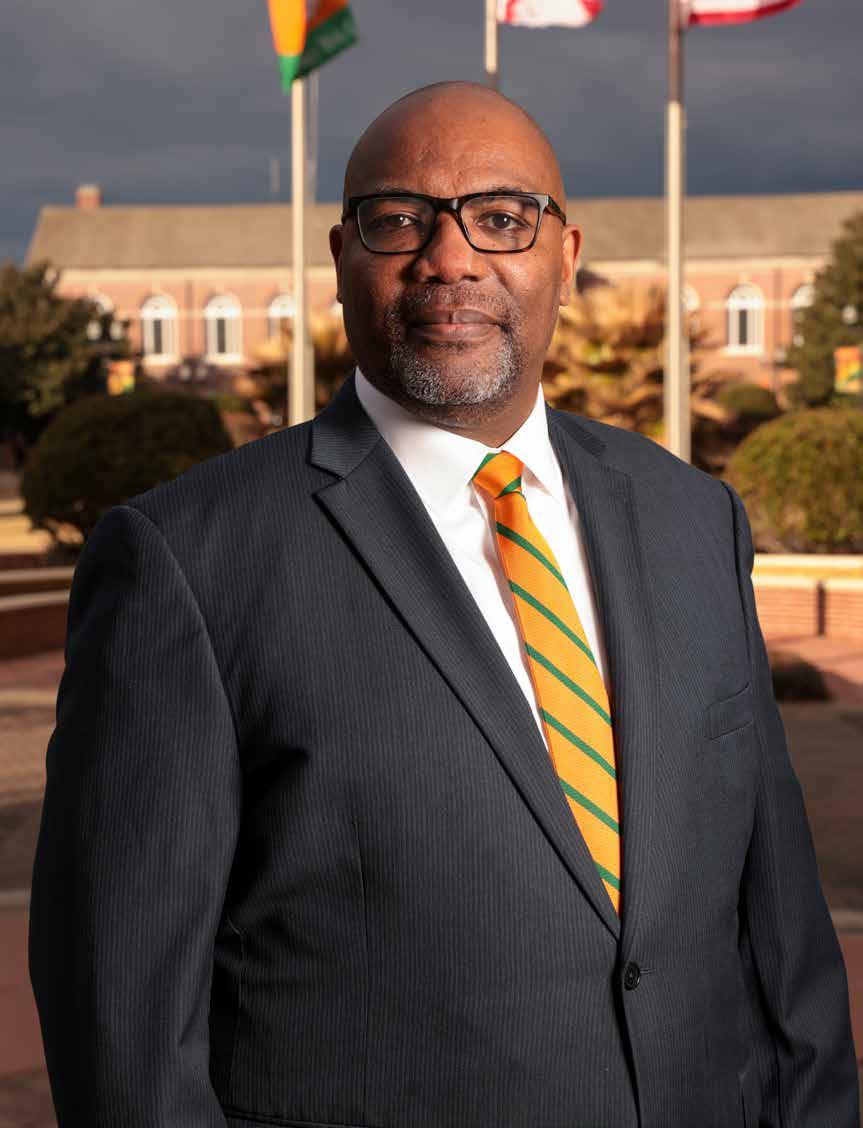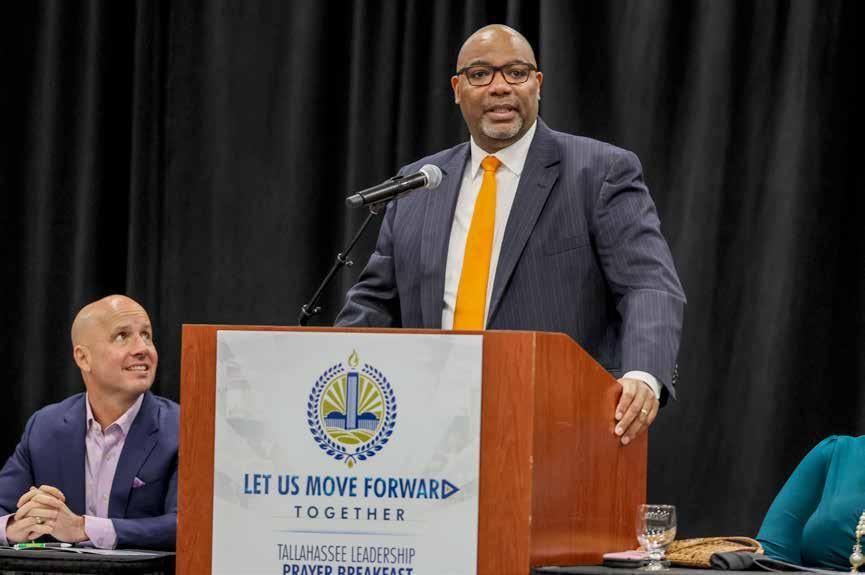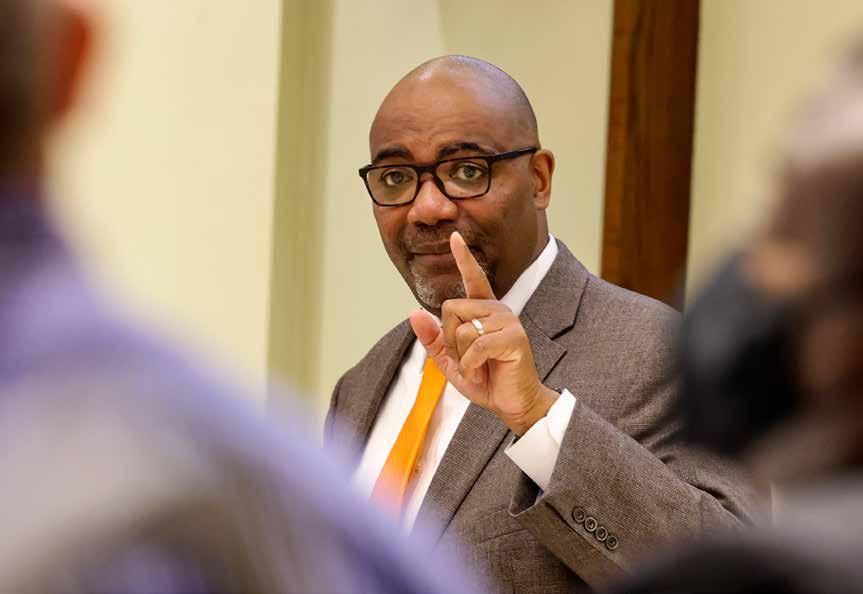
5 minute read
Maurice Edington’s rise from junior untenured faculty to the university’s
BY [ Andrew J. SKERRITT ]
IIn 2013, when Florida A&M University (FAMU) completed a national search for a dean for the newly created College of Science and Technology, the University selected Maurice Edington, Ph.D.
In 2017, when Florida’s only public Historically Black College or University (HBCU) needed a vice president to lead the newly created Division of Strategic Planning, Analysis & Institutional Effectiveness, the University again turned to Edington.
In 2018, following a national search, Edington was selected to serve in the powerful position of provost/vice president of Academic Affairs.
With the University now aiming to rank among the U.S. News & World Report Top Public 100 Colleges & Universities, President Larry Robinson, Ph.D., turned to Edington in December 2022 for the newly created role of executive vice president/chief operating officer (COO), the second highest ranking position on campus.
Edington is charged with providing direction and oversight for university leadership to implement strategies and systems that improve the quality and efficiency of services and operations while enhancing accountability.
“Dr. Edington is an example of a person who has worked his way through the ranks of higher education and has excelled at every stop along the way,” Robinson said. “His expertise by itself qualifies him for the role of chief operations officer. However, Maurice’s commitment to our mission to promote student success, his compassion for our faculty and staff, his integrity, and his ability to develop a plan and inspire others to follow are among the reasons that he is my choice to serve as COO at FAMU.”

Edington assumed his new role with the unique perspective of having served the University at almost every academic and administrative level: from junior untenured faculty member to provost, from director to vice president.
“Serving in those varied administrative roles provided me with a broad set of professional experiences and expertise. I became very knowledgeable about most aspects of this University’s operational and administrative strengths,” Edington said. “This new role is a blessing. It perfectly aligns with the kinds of skill sets and abilities I have acquired and supports my desire to assist FAMU in achieving the ambitious goals outlined in the new strategic plan. It takes advantage of my unique awareness of this University from top to bottom.”
Unlikely Path
Edington is driven by his commitment to helping students born out of his personal story and hard-fought path to success. He is the youngest of three brothers. Because Edington’s mother and father had struggled with substance abuse, he was raised by his grandparents in Berkeley, California.
“My family was one where education was not a big thing. In my family, if you graduated from high school, that was considered a major accomplishment,” said Edington, for whom education was a beacon. “I always had an affinity for learning, reading, math, and science. That’s what got me through life.”
Although no one in his immediate family had attended college, Edington spent many summers on the posh University of California, Berkeley campus and dreamed of one day attending college
That dream took shape after he saw the first episode of “A Different World,” the 1980s era “Cosby Show” spinoff that showed life at Hillman College, a fictional HBCU.
“I asked a classmate whose family had a history of attending HBCUs, if it was real,” Edington recalled. “I said, ‘I’ve got to go to one of those schools.’”
Soon afterward, Edington learned about Fisk University in Nashville, Tennessee, and applied.
“I was poor. I didn’t know if I could afford it until they sent me the financial aid letter,” he recalled.
That summer, he boarded a Greyhound bus in Oakland for the three-day, 2,300-mile cross-country drive to campus with $400 in his pocket and a duffle bag.
“I’m thinking, I can’t fail. I was intimidated when I saw all those kids from middle-class families and two-parent households. I feared that I wasn’t prepared,” Edington said. “But when I got into class, I quickly realized that I could handle the coursework and perform at a high level.”
Edington left for college without any expectation of money coming from home. Halfway through his first semester, he was in a panic. He feared he didn’t have enough money to finish his first year or even return to northern California.
In desperation, the first-year student did what many dedicated students do. He turned to his favorite faculty member, Professor Princilla Evans, Ph.D., for help. How could he earn a scholarship? When the chemistry professor learned Edington wasn’t on a scholarship, she jumped into action.
A week later, he received a call from the financial aid office. He had a scholarship.
“It was a tremendous blessing. That changed my whole life,” he said. “I ran to thank Dr. Evans.”
Initially, Edington thought he wanted to be a medical doctor. Influenced by Professor Evans’ work as a scientist, he changed his major from biology/pre-med to chemistry

“I started to model her habits and behaviors. I started tutoring. I fell in love with research. I wanted to go as far as I could go in the pursuit of knowledge,” Edington said. “She is still my mentor. She is the reason I am here.”
As graduation approached, Edington explored opportunities to pursue his doctorate. He settled on nearby Vanderbilt University, a campus where he could conduct research. In 1997, Edington earned a doctorate in physical chemistry. Edington then accepted a position at Duke University to serve as a postdoctoral research associate, where he continued to conduct research in the areas biophysical chemistry and chemical physics.
At that time, another physical chemist, Frederick S. Humphries, Ph.D., occupied the FAMU presidential suite. Edington applied and was hired as a junior faculty member in what was then the College of Arts and Sciences. It was the beginning of a rise that would lead to tenure, department chair, and a series of increasingly senior administrative roles.
“I wanted to be in a place I could do research at a high level and give back to students like me the way I was helped. I didn’t want to go to a PWI [predominately White institution] as a faculty member.
I didn’t think I could have that kind of impact on students,” Edington said. “I wanted to be at an HBCU that was active in research. That’s how I found FAMU. I wanted to contribute to the culture and help students to reach their full potential. That’s still my motivation.”
Many of the FAMU students who conducted research in Edington’s laboratory under his supervision have gone on to earn advanced degrees in chemistry, medicine, and dentistry.
In more than two decades at FAMU, Edington served as chemistry department chair, a director of the Office of Engineering Science Support, and a director of the Quality Enhancement Program (QEP). He led efforts to prepare the University for Southern Association of Colleges and Schools Commission on Colleges (SACSCOC) accreditation before being promoted to dean, then vice president for Strategic Planning Analysis & Institutional Effectiveness, and later provost/vice president of Academic Affairs.
In his new role as executive vice president/chief operating officer, Edington is charged with operational and administrative oversight to bring more accountability to FAMU. His mandate is to ensure the University institutes industry best practices in its administrative and operating procedures, while maintaining a laser-like focus on improving performance.

“We’ve made tremendous strides as an institution over the past several years, but we also have some opportunities for improvement. We must better align some of our practices with industry best practices and ensure we have the right talent in place across the organization,” Edington said. “We are humming along, but we have more work to do to realize our vision of being recognized as a leading national public university.”


